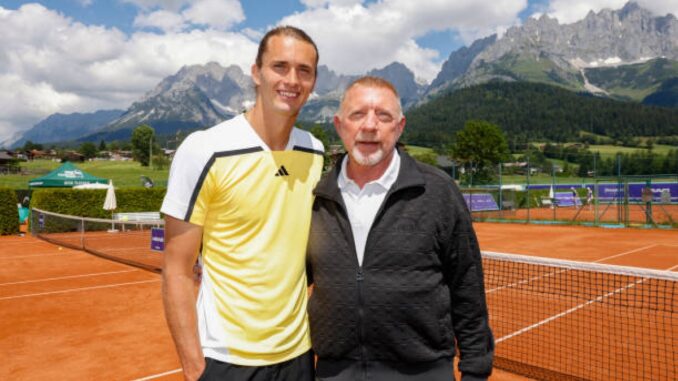
In the wake of a shocking first-round defeat at Wimbledon 2025, German tennis star Alexander Zverev laid bare his emotional turmoil, confessing feelings of loneliness and a lack of joy both on and off the court. The world No. 3’s candid press conference, following a grueling five-set loss to Arthur Rinderknech, sparked widespread concern and reignited discussions about mental health in professional tennis. Among those reacting was tennis legend Boris Becker, a six-time Grand Slam champion, who expressed both empathy and critique, advising his “sporting adopted son” to keep such personal revelations private after an early Grand Slam exit.
Zverev’s season had begun with promise, as he reached the Australian Open final in January, only to fall to world No. 1 Jannik Sinner. However, his form has since faltered, marked by a 7-5 record in Masters 1000 tournaments and a painful quarterfinal exit at the French Open against Novak Djokovic. The Wimbledon loss, his first first-round Grand Slam defeat in six years, deepened a period of crisis for the 28-year-old, who admitted, “I’ve never felt this empty before. Just lacking joy, just lacking joy in everything that I do.” He spoke of feeling “very alone” and even hinted at seeking therapy for the first time, a stark admission for a player long considered among the sport’s elite.
Becker, who has often championed Zverev’s potential, was visibly moved by the press conference, revealing on his podcast with Andrea Petkovic that he “cried” watching Zverev’s raw vulnerability. “A person opened up and said, ‘I have problems, I have mental problems, help me. I don’t have anyone around me except my daughter, who is four years old, with whom I like to spend time, where I laugh and smile,’” Becker recounted. Yet, while expressing deep concern for Zverev’s well-being, he questioned the timing of such disclosures. “If I had been his coach, I would have advised him not to reveal such information about his mental state at the Wimbledon press conference,” Becker said. “Ideally, you don’t open up when you’re eliminated in the first round of a Grand Slam tournament.”
Becker’s advice stems from his belief that public vulnerability after a high-profile loss could amplify scrutiny on Zverev, who has faced significant off-court challenges, including unproven allegations of domestic abuse, which he has denied. Despite this, Becker remains optimistic about Zverev’s future, asserting, “I am convinced that he will win his Grand Slam and that he can become number one at some point.” He suggested that the emotional outpouring might have been a necessary catharsis, potentially waking Zverev and those around him to address his struggles more privately.
The tennis world has rallied around Zverev’s openness, with players like Aryna Sabalenka urging him to seek support to prevent his struggles from “destroying” him. Sabalenka, who has benefited from therapy herself, emphasized the importance of confiding in trusted individuals. Meanwhile, Becker’s earlier advice to Zverev included taking a break from the relentless tour schedule. After Wimbledon, he suggested Zverev skip the Swiss Open in Gstaad and instead take time to reconnect with himself, perhaps by “renting a boat” with his girlfriend Sophia and “island hopping” to restore his mental strength.
Zverev’s recent training stint at the Rafa Nadal Academy in Mallorca, under the guidance of Toni Nadal, sparked speculation about a coaching change, though Toni clarified it was a temporary arrangement. As Zverev prepares for the Canadian Open, where he is the top seed, the tennis community watches closely, hoping he can rediscover the joy that has eluded him. Becker’s blend of critique and encouragement underscores a broader conversation in tennis about balancing vulnerability with the sport’s relentless demands, leaving fans and analysts alike rooting for Zverev to reclaim both his form and his inner peace.
Leave a Reply